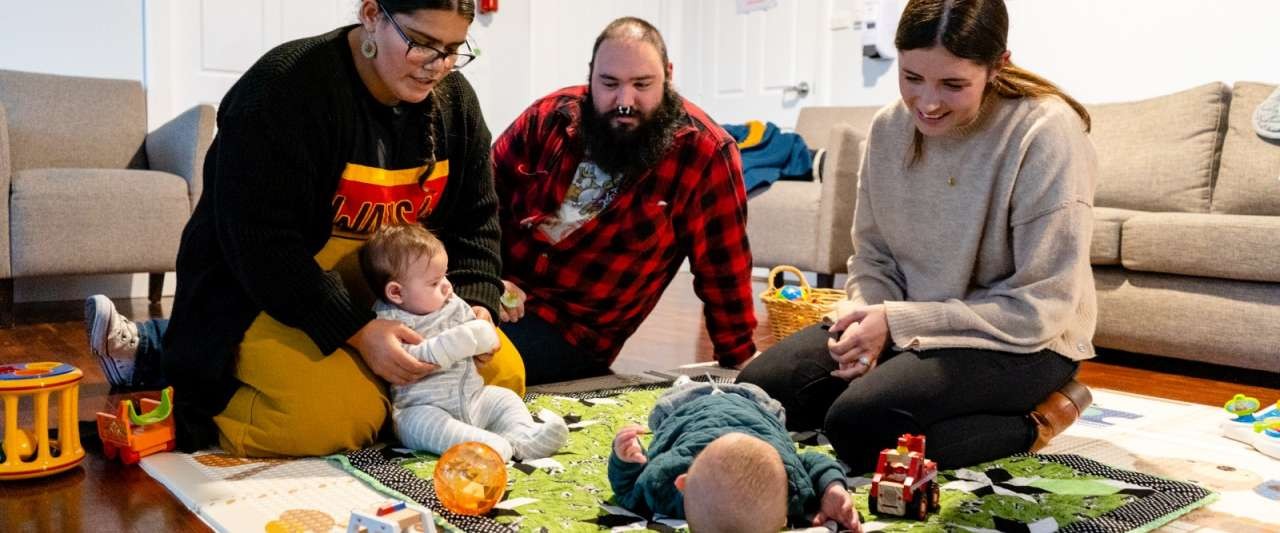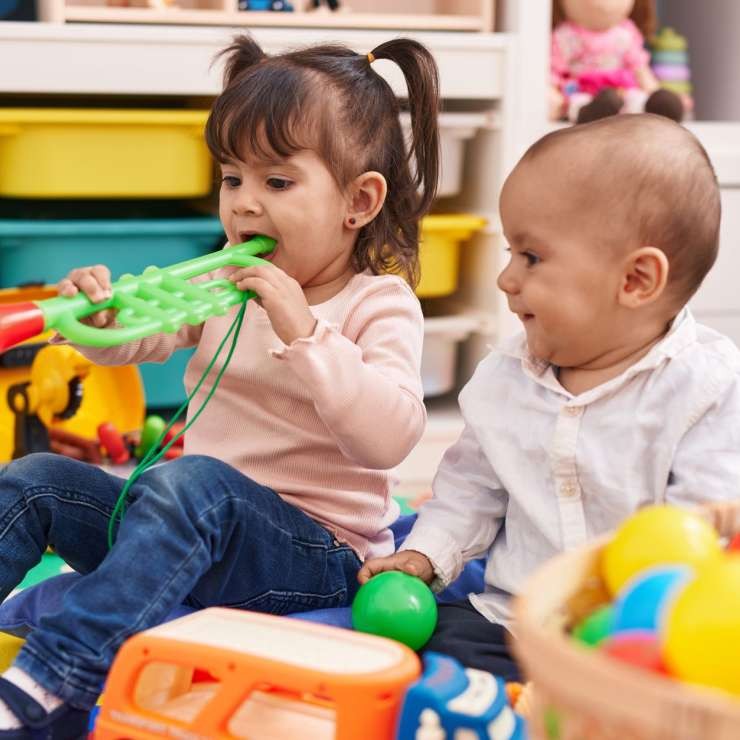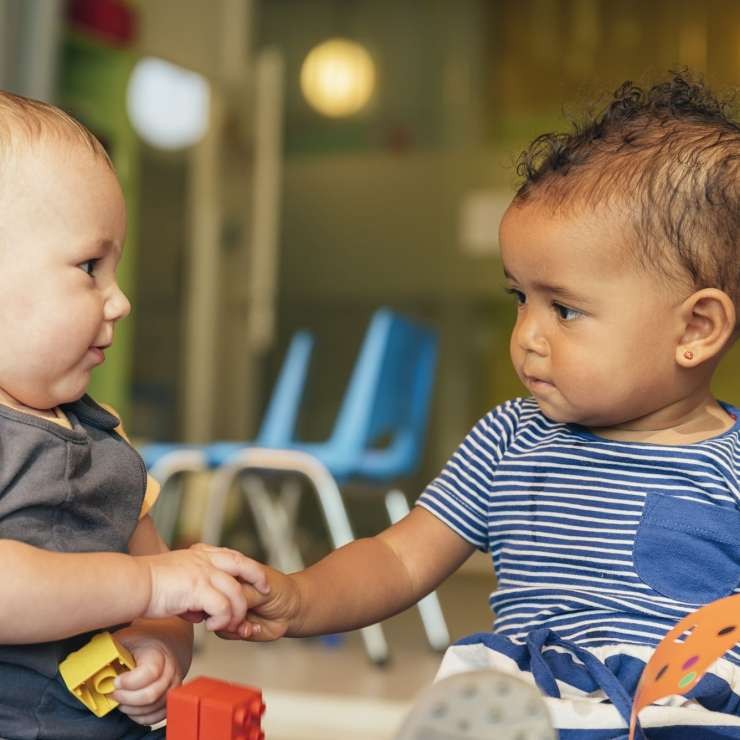Social Competence

Families and communities are made up of all different types of people. Just like adults enjoy catching up and spending time with friends or family members, children also gain great benefit from doing the same. Meeting and interacting with a range of people in different places can help kids learn important social skills and prepare them for life.
Arabic / عربى Dari / داري Hindi / ਪੰਜਾਬੀ Malay / Bahasa Melayu Swahili / Kiswahili
- Going to a playgroup is great for children to play and learn together, as well as an opportunity for parents to socialise. There are lots of playgroups happening across our area. Find one close to you.
- Socialising and forming strong relationships helps children develop a sense of self; it builds up their confidence and social skills like teamwork and sharing. Find out how to bond with newborns.
- Social skills and social development are important for all children. Watch videos on parents sharing their experiences.
- See below for links to some fun activity sheets and information for families:
Supporting your child's social competence
Check out the below ideas, information, resources, activities and programs that support a child’s social development.
Building children’s social skills – Raising Children Network
Social skills help children with knowing how to act in different social situations – from talking to grandparents, to playing with friends at school.
Social skills can help your child make friends, learn from others and develop hobbies and interests. These skills can also help with family relationships and give your child a sense of belonging. And good social skills are important for your child’s mental health and overall quality of life.
Social skills for children include:
- Play skills – for example, taking turns in games or sharing toys
- Conversation skills – such as, choosing what to talk about or what body language to use
- Emotional skills – managing emotions and understanding how others feel
- Problem-solving skills – dealing with conflict or making decisions in social situations.
For more great information please visit raisingchildren.net.au.
The Family Haven - Mooroopna: A Community Gem
Discover The Family Haven in Mooroopna – an inviting sanctuary for parents, carers, and their children. No referrals or appointments needed; just walk in and feel at home!
Location: 15-17 Young Street, Mooroopna (formerly the SPC canteen).
Hours: Tuesday to Thursday from 10.00am to 2.00pm.
Features & Services:
- A tranquil setting for parents and children to relax.
- A space for parents to engage, share experiences, and bond.
- A play-centric zone where children can meet peers and revel in fun.
- Information on community services and programs, facilitated by approachable staff and volunteers.
- Handy transport services available – offering rides to families for pickup and drop-off.
For more insights or to connect directly, reach out to the wonderful Courtney (Family Haven Coordinator) at 0428 736 961 or visit The Family Haven's official website.
Playgroups in Greater Shepparton
‘Play is one of the best ways to help children learn and develop skills, including social skills. When you and your child play together, it gives your child the chance to practise turn-taking, coping with winning and losing, following rules and more.’ -Raising Children Network
Embark on a rewarding journey with Greater Shepparton's community playgroups, tailored for children under school age and their parents or carers.
Benefits for Children:
- Engage in interactive play with peers.
- Develop new skills and broaden their understanding of the world around them.
Benefits for Parents & Carers:
- Take an active part in your child's playtime activities.
- Enjoy the opportunity for a relaxed conversation over a cuppa with like-minded parents and carers.
With the majority of our playgroups available at no cost, sessions typically last between 1.5 to 2 hours each week, striking the perfect balance between play, learning, and bonding.
Click here to explore the various playgroups in Greater Shepparton and consider joining one next week.
Activity Sheets for Child Development
Unlock a world of joy and learning for your child right from the comfort of your home. Our range of activity sheets offers fun, straightforward play sessions that not only entertain but also enhance essential social skills.
By engaging with your child through these activities, you’ll foster valuable lessons in turn-taking, sharing, problem-solving, and effective communication.
Available Activity Sheets:
- Mirror Mirror – Ideal for ages Birth to 1 year.
- Build a Tower – Suitable for children aged 2 to 3 years.
- Making Dinner – Tailored for the 3 to 4 years age group.
- Kitchen Orchestra – Perfect for kids between 4 to 5 years.
Delve into any of these enriching activities this week and witness the magic of play combined with learning.
Explore Greater Shepparton’s Parks and Playgrounds
With the weather warming up, it's the perfect time to embrace the outdoors and reconnect with your community. Head to your local park or playground for a catch-up with friends and family. Bring a picnic to share, let your kids have a blast on the playground, toss a frisbee or a ball, and enjoy quality time while chatting about your day or week.
Check out our diverse range of parks, playgrounds, and reserves here.
Activities in the Park - Rediscover the Joy of Play
The 'Activities in the Park' program is in full swing, offering lots of exciting activities throughout Greater Shepparton. It's an excellent opportunity for both children and adults to participate in fun, enriching experiences.
Why not check out the Bush Playgroup, running every Tuesday at the Kialla Botanic Gardens from 9.15am to 10.45am. It’s the perfect opportunity for children to engage with others while exploring the great outdoors. And while the kids play, parents have the chance to connect with other parents in the community.
Stay in the loop with all the great activities happening over the next month by downloading the official Get Mooving App or visiting the Get Mooving website.
Babies love to socialise too!
It is important that we socialise from a very early age, because it’s a practice we need at every stage of our life. Never think that your baby is too young to start socialising. Babies are active learners from the time they are born and gain great benefits from social interaction and play.
Babies are born to mingle, whether it's with you, a big sibling, a grandparent, or their favourite fluffy teddy bear. In the most basic sense, socialisation doesn't need to be taught because it's already ingrained at birth. Providing love, care and attention to your little one and modelling good social behaviour are the best ways to promote your baby's social development.
Babies need socialisation early on, but you're probably providing it without even realising it. Ways to promote social development in babies include:
- Skin-to-skin contact
- Feeding (including breastfeeding)
- Talking to your baby
- Story time and cuddles.
These will all start helping your little one feel like a part of a community, which at this stage, is your family.
Some of this information has been taken from whattoexpect.com
Local play and social groups for parents/carers of infants
Much of the interaction that's required for social development in the early weeks for a baby comes naturally within the family unit, but if you are ready to get out and about with baby in tow, there are some great play and social group options for parents/carers in our community:
- Maternal and Child Health (MCH) Parent Groups – First time parents are invited to attend a group running near them. Running for six weeks, you get to meet other parents with babies of a similar age, and you’ll be provided with information about different services and support available. Contact the MCH service on 5832 9312 for more information about First Time Parent Groups.
- Just 4 Bubs Playgroups – For babies under 12 months and their parent/carer. It is a great follow-on from the MCH First Time Parent Group. The environment provides safe play spaces and appropriate toys for babies to explore and play with. At Just 4 Bubs Playgroup, parents/carers can meet others going through the same stages, at the same time.
Find out more information about Just 4 Bubs Playgroups - Baby Rhyme Time - These free engaging sessions are filled with 30 magical minutes of soothing songs, rhythmic rhymes and enchanting stories. Suitable for babies aged 0 to 2 years and their parent/carer. No need to worry about booking in – just show up and join the fun! Go to the Goulburn Valley Libraries website, visit gvlibraries.com.au or call 1300 374 765 to find out when a session is on at a library near you.
Of course simple, everyday activities like going grocery shopping with your baby, taking them for a walk in their pram, or going to a café for a coffee with friends, are all opportunities for your baby to experience the world around them and start to build their social skills. Becoming familiar with different sounds, with different people and different settings all contribute to a child’s social development.
Supporting children with special needs to build social skills
Just like other children, those with a disability keep learning, but they may take longer to develop new skills, and they might learn in slightly different ways.
Children learn best through ‘every day’ experiences and interactions in familiar surroundings, with the people close to them. Social development (helping children develop social skills and enjoy socialising) is important to overall development.
Play and friendship help children with disability learn skills and abilities, including social-emotional, communication and physical skills. Playing with others can help children with disability have fun and feel included, supported and cared for. This can also be great for their self-esteem.
The Raising Children Network
This service has many resources to help parents and carers build understanding and confidence in their abilities, offering a range of parenting information including disability specific resources.
‘Play and Friendship for Children with a Disability’ provides practical information and tips covering the following topics:
- Why friendship and play are good for children with disability
- How children with disability learn and develop through play with others
- Practising play with children with disability
- Playing with others: making it easier for children with disability
- If play doesn’t go to plan
- Understanding play
You may also be interested in ‘Helping children with a disability learn through everyday interests and play’. It has some useful ideas on using your child’s interests to assist with all areas of learning and play.
Inspired Carers
This service provides information, support and education, both individually and in group settings, to parents who have a child with a disability. Inspired Carers programs provide opportunities for parents to share experiences and learn in a supportive environment. Connecting with other parents can be a great way of getting informal advice and support.
If you would like to find out more about how Inspired Carers can help, contact manager@inspiredcarers.orgm, phone 5831 7157 or visit www.inspiredcarers.org.au.
Play Connect+
The PlayConnect+ program is open to all children with disability and/or developmental concerns aged 0-6 years (school holiday programs available for 5-8-year-olds), their families, carers and siblings. No diagnosis is required. All sessions will be facilitated by qualified professionals. The PlayConnect+ program is a great way for families to connect, share knowledge, ideas and have fun!
When: Tuesdays from 9.30am to 11.30am
Location: 1-19 Gowrie Street, Shepparton
Contact: Kim Starkey
kstarkey@playgroup.org.au
0467 302 377
Triple P Stepping Stones Program
This program is based on Triple P’s positive parenting strategies. It helps parents and carers manage behaviour and developmental issues common in children with disability. It also assists to encourage behaviour you like, cope with stress, develop a close relationship with your child and teach your child new skills.
For more information visit www.inspiredcarers.org.au or go to Stepping stones for parents of a child with a disability.



